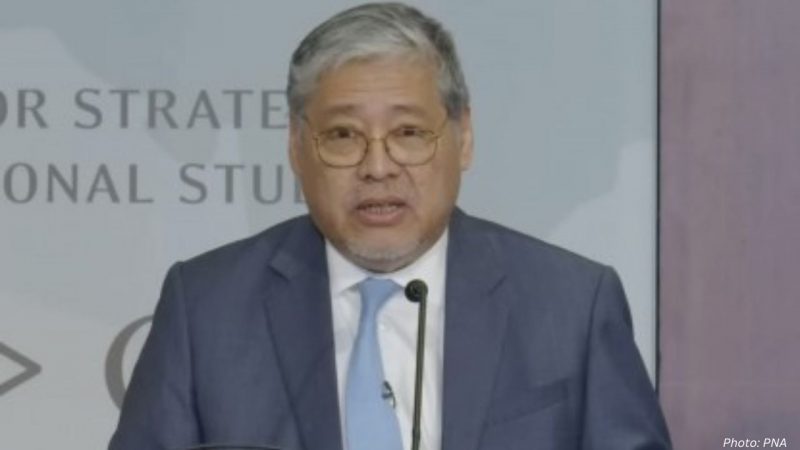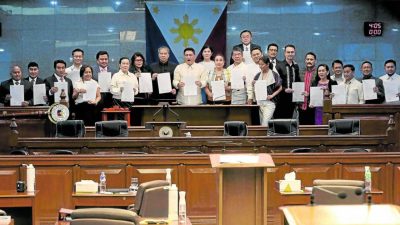MANILA – The Philippine government has reaffirmed its commitment to uphold the 2016 Arbitral Award as it joined partner states in marking its seventh anniversary on July 12.
Foreign Affairs Secretary Enrique Manalo said the award, which ruled that China’s claims under the so-called nine-dash line are illegal, “is now part of international law.”
“Just as lighthouses aid vessels in navigating the seas, the Award will continue to illuminate the path for all who strive towards not just the peaceful resolution of disputes but also the maintenance of a rules-based international order,” Manalo said.
“We will continue to translate the positive outcomes of the Award into positive gains for our people to secure our legitimate interests in our maritime domain, and to promote peace, security and prosperity in our region,” he added.
In 2022, Manalo stated that the ruling will serve as one of Manila’s “twin anchors” in any policies and actions on the West Philippine Sea.
Despite China’s repeated rejection, the Hague-based Permanent Court of Arbitration (PCA) said the country is still bound by the award.
Manila brought Beijing to the PCA in 2013 amid overlapping sovereignty claims over features at the Spratlys in the South China Sea.
Apart from this, Manila had been calling out China’s artificial island-building on the resource-rich waters, which had caused “irreparable harm to the marine environment” and “negatively affected the economic activities” of the country.
‘Growing number of support’
This year, Manalo welcomed the growing support for the decision, the latest of which came from India, which explicitly called for the adherence to the 2016 ruling.
During the Stratbase ADR Institute forum titled “The 7th Year of the Arbitral Victory: Defending the West Philippine Sea, the Indo-Pacific, and the Rules-Based Order,” India Ambassador Shambhu Kumaran explained that India sees “growth and opportunities” in the region — one of the main driver behind the expansion of its Act East Policy to the Indo-Pacific.
Without specific reference to any nation, Kumaran said India had also entered into an arbitration proceeding for the delimitation of its maritime boundary with Bangladesh.
The judgment in that award was not entirely in India’s favor, he said, but the country went on to recognize and implement it.
“I think that brings me to my final set of observations which is to reiterate that all countries have an obligation to respect international law,” he said.
“But perhaps, bigger countries have larger obligation to respect international law. And that, in adhering to agreements that have already been signed and in implementing them is the real test of state behavior,” he added.
Japan, Australia, the European Union, France, the United Kingdom, and the United States also echoed support for the landmark ruling in its seventh year.
Japan’s Foreign Minister Yoshimasa Hayashi underlined Tokyo’s opposition to attempts to change status quo by force or coercion.
“Japan renews its objection to maritime claims in the South China Sea that are inconsistent with UNCLOS and remains seriously concerned about the current situation,” he said.
Japanese Ambassador Kazuhiro Koshikawa in the Stratbase forum said the country also supports Manila commitment to the peaceful settlement of South China Sea disputes.
Australian Ambassador HK Yu said Canberra’s actions in the region would also be guided by its intention to enhance maritime security and uphold international law.
“That is why we invest so heavily in maritime partnerships in the region— to build maritime awareness, combat challenges like illegal, unreported and unregulated fishing,” she said.
“And that is why we will continue to exercise freedom of navigation and overflight, support the rights of others to do the same and strengthen our relationships with our regional partners,” she added.
European Union Ambassador Luc Veron added that the bloc is one with the Philippines and other international partners in stressing the importance of upholding international law as basis for peace and stability.
“The EU is determined to work with the Philippines and other partners in support of a free and open Indo-Pacific and, more broadly, a free and open international order based on the rule of law, respecting the UN Charter to the benefit of all countries, irrespective of their size or their power,” he said.
“The EU also stands ready to facilitate activities which help build confidence, and prevent and defuse tensions,” he added.
UK Ambassador Laure Beaufils likewise affirmed that the UK will stand up for the principles of sovereignty, territorial integrity and non-aggression.
French Ambassador Michele Boccoz, meanwhile, pointed out that the ruling’s relevance is gaining “a stronger momentum”, citing the wider support of like-minded nations.
“We welcome this trend and we will continue to show our support. We will continue to walk the talk,” she said.
She said France will also support the Philippines’ candidature to the United Nations Security Council for the 2027-2028 period. (PNA)







